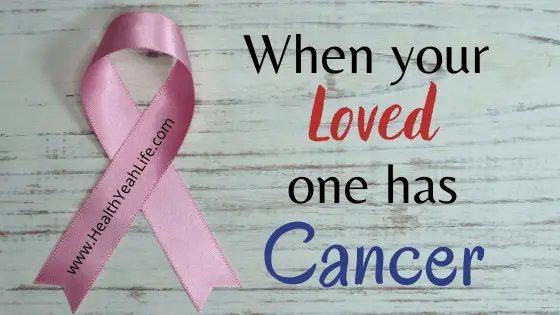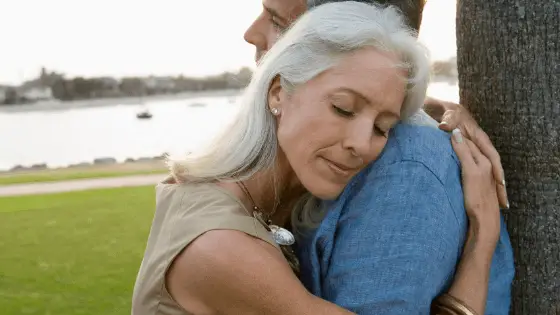
When anyone we know is diagnosed with cancer, it always comes as a shock. It may be followed immediately by thoughts about how their cancer diagnosis will affect them and how it will affect your relationship. However, when it is your spouse or a loved one, the situation can seem unreal.
It may feel as …
if the world around you completely collapses, and you are left trying to figure out how to survive. You may go through the five stages of grief: Denial, anger, bargaining, depression, and finally, acceptance. However, in many cases, it is the healthy spouse or family member that feels that they must remain strong. If their spouse has this terrible diagnosis, then the least they can do is provide a calm, relaxing atmosphere.
Regardless of how one reacts to the news initially, it quickly becomes essential to figure out how to navigate through this difficult time.
Facing Cancer Together
One of the most necessary steps in dealing with a cancer diagnosis is supporting the person with cancer. However, it can be equally important to ensure that you are being supported as well. Many times, a spouse becomes so fixated on helping their partner that they lose sight of their own needs.
Cancer is a scary diagnosis. While modern medicine has made tremendous progress towards better treatments, we are still a long way from a perfect solution. During this time, the range of treatments will take a toll on everyone involved. To better prepare yourself and your loved one, you must deal with several important topics as a team.
First, you need to discuss the cancer diagnosis and what is the best treatment will be. Knowing that you both view the situation, the same will help them understand that they are not alone. While it will also provide you with some comfort, knowing that they trust your judgment and value your help.
A less pressing matter to discuss is dividing household chores, schedules, and other tasks between you. Their treatment schedule may mean that they can no longer pick up the kids from school. Depending on the severity of their treatment, it may impact what chores they can and cannot do. Talking about these changes helps your partner face these challenges instead of being frustrated or embarrassed. Don't forget that a detrimental part of having cancer is a loss of independence in some areas. Different people will deal with this in their own way, but your support and understanding are incredibly important.
One of the most significant hurdles to overcome in this situation is how best to communicate the news to your children, family, and loved ones. Ensuring that you are both on the same page with how to face this challenge can make it easier. While no time is a great time to convey this news, it's something that must be done.

Talking Instead of Assuming
Unfortunately, it can become easy to go into autopilot mode when you find out your spouse has cancer. You tend to act quickly and make decisions that you feel will be the best for them. However, you may forget to ask them how they feel or get their opinion on a decision. This is usually done, not out of disrespect, but because you don't want to add stress to their life. The problem with this thinking is that they are already losing a portion of their independence. Taking away even more, or doing things without consulting them can hurt instead of help.
Communication is the key to almost any relationship. Adding a cancer diagnosis to your lives doesn't change this. If anything, it magnifies the importance of communication. Instead of assuming that what you are doing is for their benefit, take the time to ask.
This is equally important when you are trying to gauge how they feel. Don't guess based on their actions. Take the time to sit down with them and find out exactly how they feel and how they are coping with their fears, or even how they are sleeping. Straightforward, honest questions are always better than assuming that you know the answer.
How Your Spouse or Loved One Truly Feels
During this challenging period, your loved one may begin communicating less or not engaging as they have done in the past. Fear, stress, and pain can all contribute to this unwillingness to speak. So, if you ask your partner how they are feeling, don't be surprised if the answer isn't genuine. It isn't that they want to lie to you. Instead, it has more to do with their own emotions preventing them from being more candid.
Make sure that you ask often enough that they know you care but recognize when they don't want to talk. It can be incredibly difficult to be respectful of this wish, but with love and support, they will open up in time. This means that when they do start talking, it becomes your responsibility to listen. Put everything else aside for the moment, don't speak unless necessary, and give them the attention they deserve.
While it is hard to remain patient, it is imperative to their recovery that you respect their method of dealing with these emotions. After all, it is unlikely that you know how you would deal with being diagnosed with cancer. Similarly, they are trying to figure out how to deal with their diagnosis themselves. Give them time, patience, and love, while helping them understand that you are always there to listen. This is the best way to help them open up about their true feelings.
How You Feel When Your Loved One Is Diagnosed with Cancer
It can be challenging to know your feelings during this tumultuous time. However, you must take the time to examine your feelings. Processing these emotions, fears, and thoughts is the only way that you can begin to move forward again. When a loved one has received a cancer diagnosis, it can be all too easy to shut down. It would be like if someone pressed pause on your life, and you are stranded in this wasteland of pain and confusion.
No matter what happens during your partner's fight with cancer, you must fight your own battle. Too often, we become obsessed with helping our loved ones and forget to help ourselves. No matter the outcome of their diagnosis, you must work towards your own health and healing
This is one of the most challenging tasks that you will face. Don't be scared to ask for help, or even look into professional counseling. It can be a freeing experience to be able to share what you have been feeling. Through this process, you may reach a point where you can let go of your pain, doubt, and fear. Once you do, it may feel as though a heavy weight has been lifted off of you.
However, you should make sure to talk to your partner or loved one about your feelings. In the same way that you want to help them, they will want to help you. Only through open, honest communication can you both come through this ordeal better for it.
Facing Your Fears
Fear is one of the most common feelings when you find out your loved one has cancer. It is entirely reasonable to be concerned about the future and their well-being. However, you need to ensure that fear does not become the center of everything you do.
One of the best ways to prevent fear from becoming your focus is by facing it regularly. Talk with your spouse about your worries and encourage them to talk about theirs. Only good can come from sharing these concerns and working towards overcoming them together.
You may also face your fears by simply living life. Instead of letting your fears prevent you from experiencing this time together, make a point of setting dates. It doesn't have to be anything fancy. The real purpose is to enjoy your time with each other in a fun, relaxing way. While this may seem like avoiding your feelings, it generally has the opposite effect. People are more likely to open up about stressful topics when they feel more at peace.
Don't forget that your fears are just as important as your spouse's. Work as a team to communicate honestly and frequently with each other. By doing this, you can strive to be the best support for the other person as possible. They are also allowed to feel useful when they can help you through a troubling issue.

How to Tell Others About the Diagnosis
There are very few situations where you should be worried about telling your friends and family by yourself. In most cases, you should sit down with your partner and discuss precisely how they want to break the news. By first discussing this, you are showing your partner that you are respectful of their privacy.
People can often get caught up in what words to use, how to gather everyone, or who to tell. The critical thing to remember is that no matter how you share this information, people will react differently. Not all of us are wired the same. Due to these differences, we don't handle troubling news in the same way. Some may react with overwhelming emotions that may be welcomed or may not be while others can respond with what seems like indifference. However, these individuals are often worse as processing their feelings and may need time.
When telling those closest to you, it's essential to address the most pressing topics: What type of cancer, how serious is it, treatments, and help that you may need. You will find that some people jump to help out, while others seem to distance themselves. Many people diagnosed with cancer report a loss of friends and distance in intimate relationships. This is often caused by people simply not knowing what they should do.
They may call less because they don't want to disturb you, even if it feels like they are abandoning you. They may avoid you because their own fear prevents them from engaging. During this time, it seems like you shouldn't be the one to put in the extra effort. However, to maintain and strengthen these relationships, it may be necessary. Reach out to these individuals and help them become more comfortable with the situation. This can be achieved by teaching them what your spouse needs, or telling them directly what is or isn't right. You will be surprised at how quickly they can adapt to the situation when given direction and information.
Support
Support systems are integral to your health and your loved one's health. You may want to face this situation on your own, but you will quickly learn that it's nearly impossible. You need each other, but you also need other people to get through this.
Support may be as simple as talking to a close friend or going out guilt-free. You may also look to a professional for support and guidance while you come to terms with your emotions. Outside of your emotional needs, you may need help with chores or picking up the kids. These are the types of things that family members excel at. Don't feel bad about relying on them. Remember that most family and friends will be anxious to help in any way possible.
An essential source of support is your loved one's doctor. Make time to attend as many appointments as you can alongside your spouse. This will help them feel cared for and will allow you to voice any concerns or questions. The doctor is there to support you both and has gone through this situation numerous times with other couples. Don't be scared to ask embarrassing questions, they have heard it all before, and you are not alone
Good Can Come From Something Bad
While this is something that is often said about tragic occurrences, it really can be true. Through painful experiences, we are usually allowed to grow beyond ourselves. We can bring out the best of who we are and build upon it.
Some couples who have dealt with cancer do not make it because they pull away from each other. However, couples that face the challenge together can often report a strengthening of their relationship. This can be achieved through communication, honesty, and support, all while facing one of the most daunting threats you may ever know.
Work together to build a new future for yourselves, working with what time you have. No matter how long you have together, you must treasure every minute, while always moving forward.
Being an advocate for your type of cancer is typically what happens. You will make sure all your loved ones and friends are taking proper precautions that they, too, seek preventative care.



